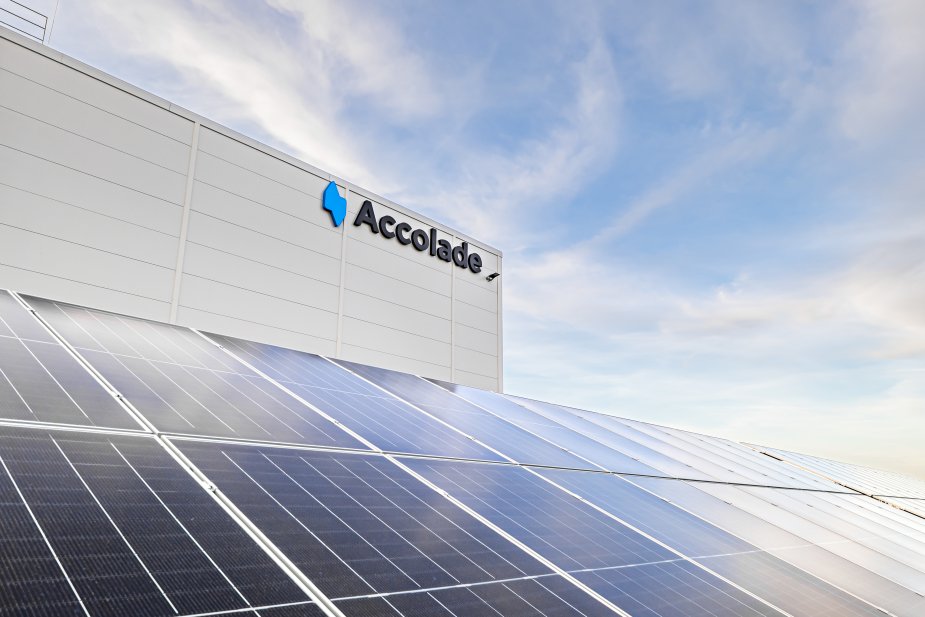Ethics and business in perfect balance
Sustainability–whether this means respecting the environment or treating business partners and employees fairly and transparently–is an integral part of Accolade’s view of all areas of business. We see it as a space where ethical and business goals meet. In both goals, we emphasise efficiency and measurability. This benefits us, our stakeholders and society as a whole. In 2024, we continued to raise our internal standards with regard to sustainability and successfully implemented key solutions.

Compliant with the EU Taxonomy
The EU Taxonomy is one of the most important legislative instruments affecting sustainably recently enacted in Europe. The purpose of this classification system is to make it easier for companies and investors to identify sustainable economic activities and to help them make sustainable investment decisions. For Accolade, compliance with the Taxonomy is one of the two main criteria that have to be met to call its buildings “green”. The other is certification under the internationally recognised BREEAM or DNGB sustainable building rating systems.
How is it ensured in practice that the industrial parks managed by the Accolade group and Accolade Industrial Fund comply with the requirements of the EU Taxonomy?
“In 2024 we launched a long-term plan to ensure that all Accolade projects meet the relevant criteria. This involves analysing and adapting 73 existing buildings with a total area of over 2 million square metres,” says Mirosław Gromek, Senior ESG Manager at Accolade.
The EU Taxonomy is also closely related to our Green Finance Framework, which defines sustainable construction standards and practices for the buildings in Accolade’s portfolio. It was developed with the help of financial experts, banks and specialist consultants.
“This framework makes us a trusted partner for both financial institutions and the users of the buildings we invest in. It also allows us to focus more on the profitability of green financing,” Gromek adds.
The Blower Door Test is one of the methods we use to assess buildings’ energy efficiency, and thus their compliance with the requirements of the EU Taxonomy. This test of a building’s airtightness and thermal integrity involves blowing air into an enclosed building using a special fan. Measurements are taken and a thermal imaging camera is used to reveal whether the building is well insulated or whether thermal bypasses are occurring.
Sustainability that can be measured
Given the size of our portfolio, we are well aware of the impact we have on our surroundings. At the same time, choosing sustainable solutions that not only contribute to environmental protection, but also reduce the financial and strategic risks associated with emissions and increase the value of our assets is a group-wide priority. We also take pains to ensure that each of the solutions we use is as efficient as possible and delivers measurable savings or other benefits.
In 2024, for example, we carried out the following across the group:
- Fourteen life cycle analyses (LCAs) of buildings in line with the EU Taxonomy. These mean we can better analyse the ratio of embodied and operational CO₂ and focus on more targeted decarbonisation measures.
- Completion of the plan to move to a higher sustainability standard for technical solutions in our buildings–including improvements to façades, HVAC systems and efficient use of renewable energy with the emphasis on efficiency.
- Assessment of more than 20 of our sites using the standardised CRVA method to propose measures to reduce the risks from phenomena linked to climate change.
- Installation of a centralised system for tracking and monitoring data on construction waste production and a system permitting more accurate monitoring of water consumption in our tenants’ operations.
These and many other initiatives underscore our belief that sustainable solutions are not just a quick fix or a fad, but genuinely have the potential to influence the long-term direction taken by Accolade and the industrial infrastructure sector as a whole.
An efficient photovoltaic programme
The first technical studies to assess the suitability of roofs in the Accolade portfolio for the installation of solar panels were carried out in 2022. The requirement for sufficient load-bearing capacity has also become part of our technical standards for all new buildings.
“While we recognise that the use of renewable electricity is not a one-size-fits-all solution, we see it as key to the potential transformation of the energy market,” says Jan Pavlik, Energy Director at Accolade.
2024 was a watershed year for the development of Accolade’s photovoltaic programme. Thanks to careful preparation and a focus on efficiency, particularly in terms of planning adequate installation capacities matching tenants’ needs, the cumulative installed capacity across the group’s portfolio in the Czech Republic, Po-land and Spain exceeded 9,000 kWp at the end of the year.
“Experience shows that a site’s own solar panels optimally cover around 30% of its energy consumption. This gives tenants the advantage of stability and predictability of this part of the energy costs. At the same time, if the installation is sized in this way, there are usually no surpluses. This is the principle we base our approach to energy on,” Pavlík adds.